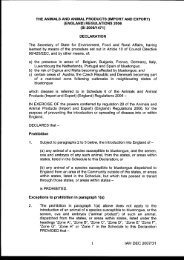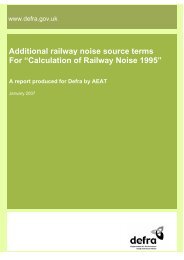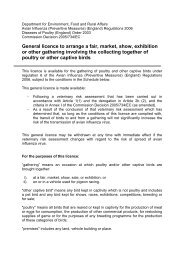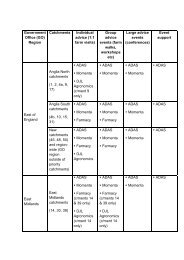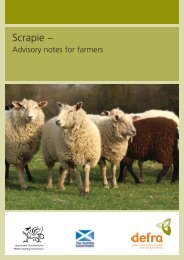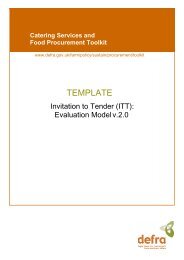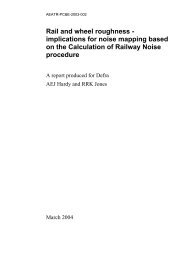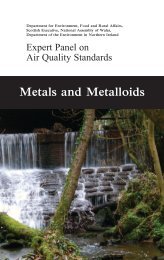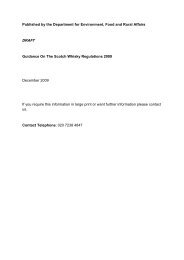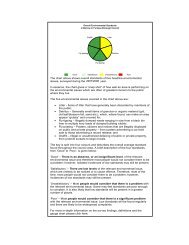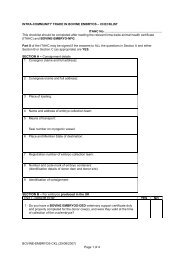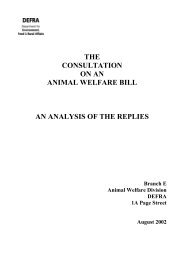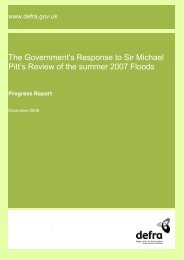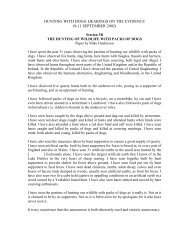Review of the Food-borne Zoonoses Research ... - ARCHIVE: Defra
Review of the Food-borne Zoonoses Research ... - ARCHIVE: Defra
Review of the Food-borne Zoonoses Research ... - ARCHIVE: Defra
You also want an ePaper? Increase the reach of your titles
YUMPU automatically turns print PDFs into web optimized ePapers that Google loves.
<strong>Review</strong> <strong>of</strong> <strong>the</strong> <strong>Food</strong>-<strong>borne</strong> <strong>Zoonoses</strong> (FBZ) <strong>Research</strong><br />
Programme 2003 – 2007.<br />
(26 th to 27 th November 2007).<br />
1. Introduction<br />
<strong>Defra</strong> is a major funder <strong>of</strong> research, spending in <strong>the</strong> order <strong>of</strong> £150 million per year. The<br />
research commissioned supports <strong>Defra</strong> in meeting its overarching aim and strategic<br />
priorities (see section 2). Approximately £40 million <strong>of</strong> <strong>the</strong> annual budget is spent on<br />
animal health and welfare research, which also serves to support <strong>the</strong> goals <strong>of</strong> <strong>the</strong> Animal<br />
Health and Welfare Strategy for Great Britain (see section 3). In general, <strong>the</strong> results<br />
generated from research are used to ensure existing <strong>Defra</strong> policies are based on sound<br />
evidence, to identify <strong>the</strong> need to develop new policy, and to support <strong>Defra</strong>‘s regulatory<br />
roles.<br />
As part <strong>of</strong> an ongoing process <strong>of</strong> evaluation, <strong>Defra</strong> research programmes are subject to a<br />
formal review process every three to five years.<br />
The remit <strong>of</strong> <strong>the</strong> <strong>Food</strong>-<strong>borne</strong> <strong>Zoonoses</strong> (FBZ) research programme covers a number <strong>of</strong><br />
specific diseases. With this in mind, <strong>the</strong> review process not only considers <strong>the</strong> merits <strong>of</strong><br />
individual research projects, but also considers <strong>the</strong> balance <strong>of</strong> <strong>the</strong> programme against its<br />
objectives by examining whe<strong>the</strong>r <strong>the</strong>re has been an appropriate prioritisation <strong>of</strong> resource<br />
to meet most effectively <strong>the</strong> objectives <strong>of</strong> disease prevention and control. In addition,<br />
given <strong>the</strong> continuing threat food<strong>borne</strong> diseases pose to <strong>the</strong> UK, <strong>the</strong> review will address<br />
how <strong>the</strong> research programme could best meet future evidence needs <strong>of</strong> <strong>the</strong> Department<br />
and if <strong>the</strong>re is sufficient resource allocated to do so.<br />
In consideration <strong>of</strong> resource management it is important to recognise opportunities for<br />
working in partnership, an underpinning element <strong>of</strong> <strong>the</strong> Animal Health and Welfare<br />
Strategy, and identifying areas where cost and responsibility sharing with stakeholders<br />
are appropriate.<br />
In broadening <strong>the</strong> scope and mechanisms by which <strong>the</strong> R&D programme may be<br />
managed, it is also necessary to identify research and evidence that may be needed on<br />
top <strong>of</strong> <strong>the</strong> current portfolio. Studies, for example, that better inform <strong>the</strong> Department and<br />
4



